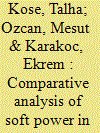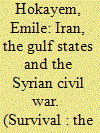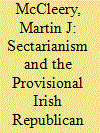|
|
|
Sort Order |
|
|
|
Items / Page
|
|
|
|
|
|
|
| Srl | Item |
| 1 |
ID:
146344


|
|
|
|
|
| Summary/Abstract |
This study explores the relationship between ethnic, sectarian, and religious identities and soft power in the Middle East and North Africa (MENA) region in the immediate aftermath of the Arab Uprisings. Utilizing original public opinion surveys conducted in Egypt and Iraq in 2012, we find that identity-based allegiances play a major role in groups’ choices regarding which countries’ increasing involvement in the region are seen favorably and which countries are seen as an ideal model for the region. Sunnis are likely to view Turkey and Saudi Arabia positively in both regards, whereas Shiites are more supportive of Iran. But our results also suggest that crosscutting cleavages should not be overlooked: Sunni Kurds are less likely to hold positive attitudes toward Turkey and Saudi Arabia. Our findings also show that Copts, a religious minority in Egypt, hold positive attitudes toward the United States and negative ones toward Saudi Arabia and Iran. These findings contribute to both the theoretical literature on soft power and the debates on international competition for influence in the MENA region by emphasizing the role of ethnic and religious identities in shaping attitudes toward international actors.
|
|
|
|
|
|
|
|
|
|
|
|
|
|
|
|
| 2 |
ID:
138610


|
|
|
|
|
| Summary/Abstract |
An essential driver of the Syrian civil war has been the involvement of Iran, Saudi Arabia, Qatar and, to a lesser extent, the United Arab Emirates in every aspect of the struggle. Their role has influenced the calculations, positioning, behaviour and fortunes of the principal Syrian players. Irrespective of whether the effect was intended, this regional competition has revealed and deepened the many fault lines that cross Syrian politics and society. It has also exacerbated the polarisation of the Middle East.
|
|
|
|
|
|
|
|
|
|
|
|
|
|
|
|
| 3 |
ID:
181042


|
|
|
|
|
| Summary/Abstract |
This article addresses the scholarly debate over sectarianism and the Provisional Irish Republican Army’s (PIRA) campaign during the Northern Ireland Troubles. It argues that although there is much merit in the contributions made in this discourse, unfortunately, for, the most part, there is a lack of engagement with the deeper meaning of sectarianism. Consequently, it seeks to enhance the understanding of sectarianism within this arena before considering the nature of the PIRA campaign. By conducting a thorough analysis of the killings conducted by this organisation in the early years of the conflict it is ultimately concluded that, at the very least, PIRA tolerated, and likely sanctioned, sectarian violence from within its ranks.
|
|
|
|
|
|
|
|
|
|
|
|
|
|
|
|
|
|
|
|
|